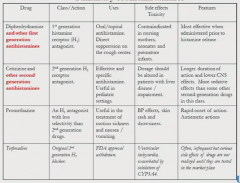![]()
![]()
![]()
Use LEFT and RIGHT arrow keys to navigate between flashcards;
Use UP and DOWN arrow keys to flip the card;
H to show hint;
A reads text to speech;
27 Cards in this Set
- Front
- Back

drug list
|
learn em
|
|
|
where is histamine at?
|
they're in mast cells (organs) and basophils (in blood cells) which sit in lung, skin, intestinal mucosa: first defense
|
|
|
how do you make histamine?
|
histidine ---his decarboxylase (PLP dependent [vit 6])--> histamine
|
|
|
When do you release histamine?
|
injury
allergy (type 1 hypersensitivity via IgE) drugs/foreign compounds |
|
|
So to get bad reaction you have the two exposures to ___ the mast cells
|
prime them. Your ab are ready and attached so if ag happens, you go crazy on it.
|
|
|
What all are mast cells releasing?
If you blocked histamine release would that stop all the effects of mast cells? |
histamine
prostaglandins leukotrienes chemotactic agents no. |
|
|
What if you combo'd histamine and leukotriene blocking?
|
it will work better
|
|
|
there are ___ different histamine receptors
|
three or four.. he contradicted it
|
|
|
H1 receptor
signaling pathways |
this is the one that we're talking about- intestinal, bronchial, smooth muscle, endothelium, brain
this one is DAG/IP3 |
|
|
what effects does histamine have?
|
hypotension in the beginning since it's all dilated and widening of endothelial gaps and fluid moves out to interstitial space and edema
respiratory effects: H1 mediated constriction GI effects: HI smooth muscle contraction |
|
|
how does histamine affect stomach?
|
gastrin -> ECL cells which use histamine to make parietal cell to release stomach acid
|
|
|
histamine and wakefulness and appetite
|
hist increases wakefulness and inhibits appetite
if you have inhibitor of H1Receptor, may have aggression and locomotion. Antihistamines can also. |
|
|
how do antihistamine drugs work?
|
inverse agonists of H1- bind to receptor in inactive state
|
|
|
popular antihistamine: first generation
side effect cleared by what does it treat mechanism work best if |
diphenhydramine
can have sedation side effect cleared by CYP450 inhibit capillary permeability, not as good for lungs inverse agonist given before the exposure |
|
|
What do you notice about cough medicines?
|
they always have an antihistamine in them, but it's kind of bad because they'll dry out the airways even if they treat symptoms.
|
|
|
What is off target effect of diphenhydramine?
|
anticholinergic (this is muscarinic ACh too)
|
|
|
Another antihistamine often used with cold products, motion sickness, nausea/vomiting
what is this drug like? |
promethazine
inverse agonist with significant central anticholinergic, sedative, antiemetic effects works quickly, cleared quickly |
|
|
an antihistamine for antidepressant
|
doxepin
very few side effects, also sleep aid |
|
|
second generation: original that's no longer available
|
terfenadine
withdrawn because cardiac arrhythmia metabolized by CYP3A4, so CYP inhibitors affect toxicity |
|
|
What are the new 2nd gen antihist's? 3+
|
fexofenadine: minimal sedation and antimuscarinic activity
cetirizine: H1 blocker. Don't go through BBB so sedation is limied, but drowsiness still serious. loratadine: oral, non-sedating H1 blocker- this one IS CYP450 metabolized so drug interactions should be noted desloratadine is getting read-> it becomes loratadine |
|
|
excretion patterns of antihistamines
|
first gen were metabolized in the liver by CYP450's like CYP2D6
2nd gen go in urine unmetabolized except loratidine which is P450 activated pro-drug |
|
|
drug interactions with antihist
|
other sedating things like barbituates but more commonly alcohol
older people don't metabolize as well, so. |
|
|
So should all pts be switched to second gen drugs?
|
not necessarily
1st gen is cheaper, well-established, know what to expect |
|
|
how are the antihist acting as an antiemetic?
|
the regions in brain has a lot of H1 receptors.
|
|
|
What else is antihist used for?
|
insomnia
|
|
|
When would you not want to use antihist?
|
type I hypersensitivity caused by another drug
don't affect asthma not useful in colds and flu |
|
|
Would diphenhydromine help stomach ulcers?
|
well not really because parietal cells have H2 and these are for H1.
|

